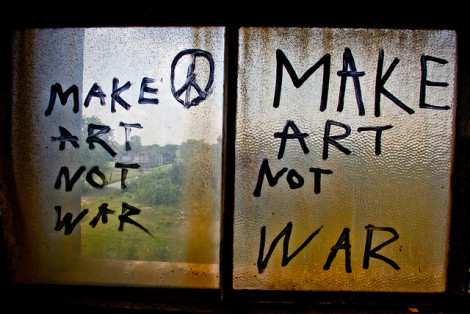On breaks at my job, a number of us are playing games of Hangman on our white boards. It’s an enjoyable way to break from the regular work, and to keep our minds limber. And it’s a fun way to find out about each other’s interests (songs, movies, artists, books, quotes).
An interesting side effect of this game: it confirms the age difference between me and most of the others in my office (which I’d guess to be about 15 years, on average—them younger). The puzzle creator chooses an artifact from his or her collection of cultural references, most of which are specific to the generation they belong to.
Sure, there’s some overlap: we’ve seen plenty of the same movies, or read the same books, or heard the same songs on the radio. (Though I wonder, how much longer will radio be the medium of choice for music, now that iTunes and Pandora and other personal, online music services are available?)
But it feels to me like those memories we consumed in our youths, in our most formative years—and that we shared with friends like some secret code—stick with us far longer than those we’ve seen or heard or experienced more recently.
“He’s the brains, sweetheart.” Han Solo, Star Wars (1977)
“I’ll get all the sleep I need when I’m dead,” Wade Garrett, Road House (1989)
“It’s not the years, it’s the mileage.” Indiana Jones, Raiders of the Lost Ark (1981)
This whole practice, and that feeling of age, has me wondering about growing even older, and what it must be like for someone who lives into their eighties or nineties or beyond—and outlives most everyone else in their generation. How hard must it be, not only to bury family and friends, but to have all these cultural references—lines from movies or books, or song lyrics, or other moments of memory or shared experience (“Where were you when Kennedy was assassinated?” “Where were you when the Towers fell?”)—that they can’t share with anyone else, now that everyone else who remembers them is dead? How hard to be the only one left who remembers things from a particular experience in the moment of it, and not from what they read or saw or heard later.
(This reminds me of The Giver: the person who keeps all the memories of the world, while the rest of society goes on without them, oblivious to what came before.)
We have history books (and websites) to do that for us, one might argue. But do those history books do the memory justice? Do they capture what it was like to live in that particular time period? To help us experience moments that happened, to the average person in that time?
They do not—at least not the history books I’ve seen, with their broad categorizations of time periods, and their focus on dates and famous figures and significant events.
No, history does not help us remember the past as it was lived. Instead, It is art, through stories, that captures the emotion, the heart, the essence of a time period, from the people that actually lived it, in a way the dry, academic histories cannot. Art provides us context—it shows, through the lens of the artist, the way things were in that moment in time.
Art, not history, is how we capture the present and freeze it so we can experience it again, not just study it or analyze it or catalog it.
That’s why it’s so important for those of us who are creatives, whether storytellers or painters or musicians or some other artist, to create our art and to share it. Even if we are not using our direct experiences of the past as the subject of our works, our creations are steeped in our memories and experiences, and those cultural artifacts will be present in our work, to be unearthed and experienced by future generations.
So if you’ve been needing one more reason to practice your art, and to put that art out into the world, now you have it.
Go now, and get busy creating something that’s uniquely you, and that reflects all the life experiences you’ve collected over your years.
“Art enables us to find ourselves and lose ourselves at the same time”. –Thomas Merton
If you’d like some additional resources and encouragement to help you make your art (and be your own hero, for all artists are heroes), be sure to subscribe by entering your email in the box in the sidebar to your right. You’ll get your own copy of the Be Your Own Hero manifesto, regular updates from the blog, and other subscriber-only tools and goodies.
[photo courtesy of Thomas Hawk (cc)]

A timely reminder of the lasting importance of what we do my friend. It’s easy to get caught up in the metrics – conversion rates, site visitors, average client sales, efficacy and efficiency – and lose sight of expression, of our joy in creation and synthesis and sharing the art inside us. Indeed, built to uniqueness by a lifetime of thoughts, experiences, and emotions.
Exactly right, my friend. Thank you for rocking your art!